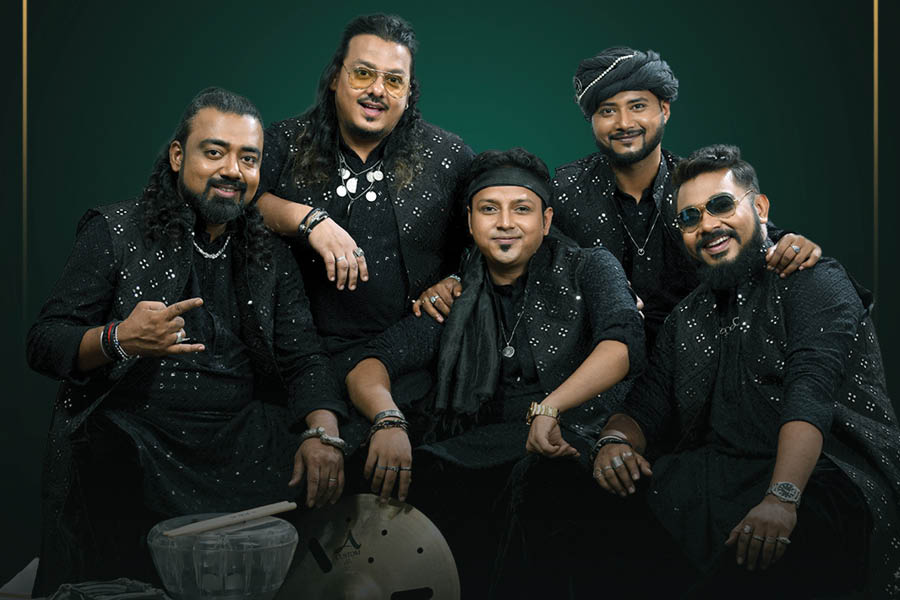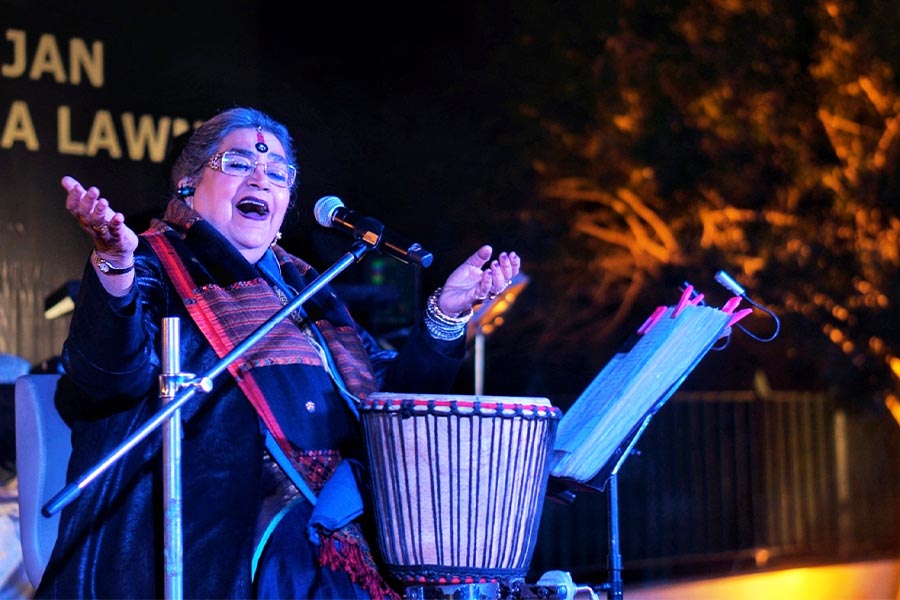Sufi music is believed to have its roots in medieval Bengal. However, this genre struggled to integrate into the fabric of Bengali popular culture and remained confined to fakirs and bauls singing in villages. Over the past one decade, the popularity of Sufi music has skyrocketed. Humsufi, a Sufi band from Kolkata, is the first group from West Bengal to make waves internationally. The band released a self-titled debut album, comprising six songs in 2016, and now, seven years later, they have dropped a new single, Marziyan, on January 1 to kickstart 2024.
Bengali boys into Sufi music
The five band members — Krsna Dwaipayan Mukherjee, Shibankar Paul, Debarshi Das, Pinaki Ranjan Dawn and Victor Mitra — deliberately chose to make a mark in the Sufi genre, steering clear from the rock band scene, which is so popular in Bengal. And Humsufi’s appeal can be attributed to their vast knowledge of Indian classical music, which has a strong presence in the sub-genres of Sufi — Qawwali, Qaul, Ghazal and folk songs. The group gauged their potential when Chinese listeners grooved to their music at a gig in Thailand. “They didn’t know the language, but they loved our music. We knew we were doing something right. We were the only band when we started off, but now there are more,” said Pinaki, the percussionist.
The formation of the band

Humsufi’s appeal can be attributed to their vast knowledge of Indian classical music, which has a strong presence in the sub-genres of Sufi — Qawwali, Qaul, Ghazal and folk songs
“Growing up in West Bengal, our musical landscape was primarily shaped by Rabindrasangeet, whereas in the north, people get introduced to Sufi songs from an early age. In our region, people were familiar with Ustad Nusrat Fateh Ali Khan and Sufi music gained prominence in Bollywood with tracks like Khwaja Mere Khwaja,” revealed Krsna Dwaipayan, the vocalist of the band.
The band officially started in 2012. “For the first five years, nobody believed we were Bengalis. They took time to realise we were from Kolkata. But people in Kolkata are open to good music. And when they felt the energy of Sufi, it clicked,” added Pinaki Ranjan.
How Humsufi clicked in Kolkata
The idea to hit the virgin market came from the late Gurpreet Kaur Sethi, whose agency manages the band. “She passed away last year. We used to call her didi. She had identified the emerging market. We knew nothing about Sufi when we started. The one common factor binding all the members was their foundation in Indian Classical Music. Pinaki is a national scholar from Rabindra Bharati University,” said Krsna Dwaipayan.
There were no Sufi bands in Kolkata back then. People would identify Sufi voices and not particularly the music. “Kailash Kher had a reputation of being a Sufi singer for his voice,” Krsna Dwaipayan further pointed out.
The presentation of Sufi music has been traditional in India. The band wanted to break the old-school method of lengthy songs with slow starts and escalating into full-throttle endings. “We wanted to make it more adaptable, so we fused Sufi with various folk sounds of India — a little bit of Latin, Jazz and Blues. It helped us discover a new soundscape. Initially, our musical syllabus was solely based on the works of Nusrat Fateh Ali Khan,” said the duo.
Humsufi is known for blending Nusrat’s Sochta Hoon with a Latin American sound and Piya Re with Rajasthani folk music. At the same time, they treat Amir Khusro’s Chhap Tilak with a Bengali folk tune. “Our challenge in every show has been to keep the crowd engaged. We were lucky that people in Kolkata recognised we were trying to do something new and different,” emphasised Krsna Dwaipayan, who also stressed on the importance of a visually appealing stage presence, complete with colour-coordinated attire, in enhancing the overall experience.
A tribute to ‘Ramaiya Vastavaiya’
The new single, Marziyan, is a tribute to an old Telugu folk song, Ramaiya Vastavaiya.
The band has delved into an electro-Sufi soundscape with the track. While the hook line is from the iconic song, certain segments of the pre-chorus are reminiscent of a section in AR Rahman’s Ae Nazneen Suno Na. “We loved the composition so much that we decided to do something with it. It’s just a one-off. We have decided not to remake any songs after this one,” revealed Krsna Dwaipayan.
The band has been trying to release original content for a while now, and there will be more releases later this year. “Our calendars are packed with shows and we barely get time. In the last few years, we have toured Thailand about 23 times, thrice to Indonesia, thrice to Hong Kong and around five times to the Middle East,” informed Pinaki Ranjan.
Humsufi boasts a diverse lineup, including multi-instrumentalist Shibankar Paul, responsible for handling the melody section, bass guitarist Debarshi Das, and drummer Victor Mitra. Paul's remarkable talent extends to playing 32 instruments, 15 of them on stage, including the melodica, harmonica, xylophone, mandolin, morchang and saxophone, to name a few.
The group has always dreamt big with regards to music and their YouTube presence. Three years ago, the video of their song, Rona Chhod De, featured a host of artistes, including Shantanu Maheshwari and Naved Jaffrey.

 (@humsufi_insta)
(@humsufi_insta)
